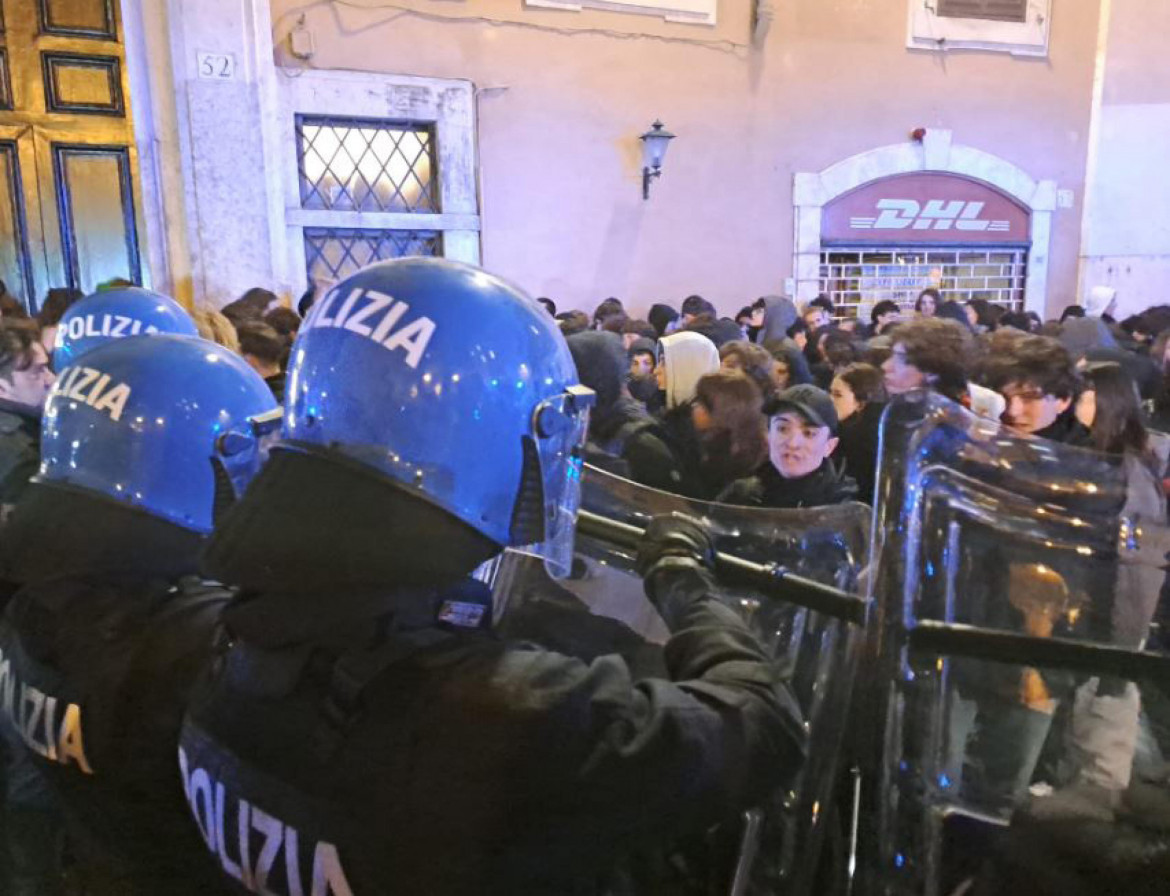Commentary
From decrees to batons, Italian institutions are repressing dissent
Is a country a ‘democracy’ if it intimidates those who demonstrate, delegitimizes those who express countercultural views, accepts detention camps and deaths at its borders, and punishes and excludes those who experience hardship?

Demonstrations for Palestine are met with batons. This is becoming an unacceptable new normal: on Sunday in Pisa, Florence and Catania, and a few days ago at the rallies at the RAI headquarters in Naples, Turin and Bologna.
The authoritarian drift that shows up institutionally as the reform of the role of the prime minister can be seen in the squares in the form of police violence, in the courtrooms with the repression of dissent, and in the public spaces with the exclusion of dissenting thought.
It almost feels like we’re living in a dystopian fiction, not reality: seriously, we can’t even say the word “genocide” in the context of Palestine and Israel? We can’t demonstrate for a ceasefire, for peace?
It would almost seem like an absurdist comedy, if we were not demonstrating to protest a tragedy and if we weren’t sliding toward the abyss.
Demonstrating for peace, for labor, demonstrating in and of itself, means enacting and actualizing the Constitution. A democracy that prevents freedom of expression, discussion and debate is abandoning its fundamental premises, the minimum conditions of a “liberal democracy.”
There is a dark thread of repression of dissent running through all this, connecting the security decrees that are coming one after another without interruption, normalizing supposed emergency situations (an oxymoron) and making exceptions (violations) of rights permanent; the practices of prosecutors’ offices, which deem protest to be subversive to democracy; the pronouncements of the civil and administrative judiciary, which inflict penalties on those who challenge political choices; the measures taken by prefects and police chiefs, making public spaces off limits for demonstrations and imposing travel restrictions on eco-activists for civil disobedience actions; the restrictions on strikes by labor guarantee commissions; the new crimes and punishments for dissent, social discontent and solidarity; and the local decrees banning people from taking part in public assemblies for those who are deemed to disturb the city’s decorum.
This thread is being woven into a black cloak, being spread over society starting from the margins: from the “antagonists,” as all protesters tend to be called indiscriminately, as everyone knows they’re all violent; from the migrants, who are not “us,” are not citizens and perhaps even a little less human; from the poor, who after all must bear at least part of the blame for their situation.
And the cloak is becoming more and more stifling, as the criminal law against the internal “enemy” becomes universal criminalization, because anyone who is against the mainstream – by their sheer material existence or by manifesting their ideas in any way – is an enemy. To be clear: the social and political expulsion of each person must be denounced and resisted, not only because it is a step toward other forms of repression, but in and of itself. Whenever a right is denied to any person without any reaction against it, this makes everyone a little less democratic, a little less human.
The logic of war, which demands that one should not think, but obey, and the hegemony of the neoliberal model, which denies all alternatives and must armor itself to survive the brutal effects it produces (on people and nature), naturally converge (after all, they originate from the same root principle of domination) in the desire to anesthetize conflict.
Passivity, acquiescence and obliviousness is the most comfortable path. And that path is facilitated by the schools and universities, which the counter-reforms tend to reduce to markets where one can buy knowledge units (credits) to spend in the labor market, sterilizing their potential as places for the creation and discussion of critical knowledge.
And if there is still resistance, if students still take to the streets, then the police charges and the trials of protesters that follow will do the job of repression and deterrence.
Is a country a “democracy” if it intimidates those who demonstrate, delegitimizes those who express countercultural views, accepts detention camps and deaths at its borders, and punishes and excludes those who experience hardship?
It is certainly not a democracy according to the design of the Italian Constitution, which aims at the overcoming of economic and social limitations, enshrines the right to asylum, repudiates war, and promotes effective participation by citizens. It is not enough to have a “democracy” in name only.
There are so many disturbing signs around us. Let us try to see them, understand their connections, denounce police violence, in itself and as a physical expression of systemic violence, stubbornly continue to demonstrate and keep the space open for a critique of the existing order.
Originally published at https://ilmanifesto.it/dai-decreti-ai-manganelli-il-filo-nero on 2024-02-24
